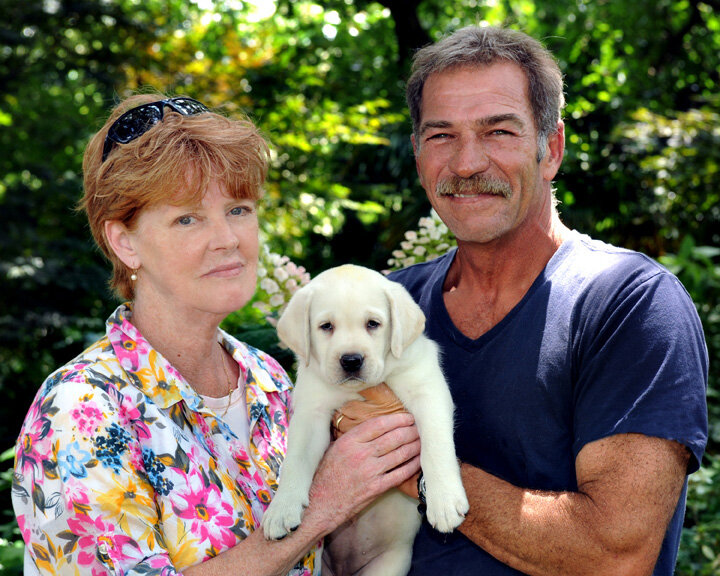Women in the NC Seafood Industry: Susan West of Hatteras Island, NC
Reprinted and edited from Tradewinds Magazine, 2020, B. Garrity-Blake. Photo courtesy of Susan West.
Susan and Rob West live deep in Buxton Woods, where deer wander through the thicket and sedge, frogs sing from a freshwater pond and – if the wind is right – one can hear the crashing of waves from Cape Hatteras seashore. In the wintertime when foliage is sparse, a sweep of light from the spiral-painted tower even finds its way through the pines.
From this point of solitude, Susan West has had her finger on the pulse of the commercial fishing industry for thirty years, even though she’s never donned oilskins or hauled a net.
“I’m a wuss and I get seasick,” she quipped. Her husband Rob, on the other hand, is up before dawn to board the Lucy B to ply Atlantic waters for Spanish mackerel. Rob came to the Outer Banks from Long Island and Susan from Maryland in the 1970s, and they met on Hatteras.
“I was a waitress at the Sea Shell Restaurant in Hatteras Village, and Rob was a cook,” Susan explained in a 2014 Coastal Voices interview. “I used hang my order in the kitchen, and bat my eyelashes and flirt with him.”
The couple settled in a low-lying neighborhood in Hatteras called Sticky Bottom and Rob took up commercial fishing, first hiring on as a mate and eventually buying a shad boat to fish pound nets in Pamlico Sound.
In 1992, anti-commercial fishing rumblings could be heard all the way to Hatteras. In response, women up and down the coast were organizing as auxiliaries to the North Carolina Fisheries Association, the state’s largest trade organization for the seafood industry.
“Some of the fishermen from Hatteras had gone to a meeting in Morehead City,” Susan recalled. “Rob came back and said, ‘You know, there were women who spoke at that meeting that are starting a women’s auxiliary.’ And I thought, hmm, we need something like that around here because we didn’t have good access to news about fisheries issues.”
Susan sat in her living room and wrote down a list of wives, mothers and sisters of commercial fishermen and started calling them to gauge their interest.
“A group of us from Hatteras and Ocracoke pulled together an auxiliary,” Susan said. The Hatteras-Ocracoke group joined a network that included the Carteret and Pamlico Auxiliaries.
“I think the Association was hoping the women would focus on bake sales and benefits to make money for the organization,” Susan laughed. “But some of us were more interested in learning about the issues and advocating solutions for those problems.”
The women wrote position papers on a variety of regulatory proposals, outlining concerns, impacts, and recommendations. They attended meetings, and even piled into vehicles to carpool to Raleigh.
“In the early years, commercial fishing was sort of a man’s domain,” Susan said. “So, to have women walk in and speak attracted a lot of attention.”
The auxiliaries did some fundraising and public relations activities; the Hatteras-Ocracoke Auxiliary took part in Beach Sweep efforts, partnering with the school and focusing on cleaning up debris in Pamlico Sound.
But their main focus was representing the voice of fishermen in the public policy arena: working watermen who were hard-pressed to tie their vessels to the dock and attend meetings, call representatives, and craft statements to be read in Raleigh, Wilmington, or New Bern.
“Even though the auxiliary was run by women and our officers were all women, it really was an organization for the fishermen. They attended our meetings locally, and so did people outside of the industry who we invited such as fisheries managers and elected officials.”
Women learned the importance of coordinating their efforts across the region and speaking as one, even when the issue du jour didn’t necessarily pertain to their specific community.
“The first issue that brought us together wasn’t even going to impact fishermen on Hatteras Island or Ocracoke,” Susan said. “It had to do with shrimp trawling. But we looked at what was happening to that sector of the industry and realized we needed to keep on top of things.”
The auxiliaries communicated with each other, and festooned houses and boats with blue ribbons and flags, a symbol for commercial fishing solidarity.
Susan stressed that although members of the auxiliaries were naïve in thinking “truth would prevail” in the world of fish politics, the women did have an impact.
“We did a pretty good job,” she reflected. “Our auxiliary worked really, really well for about ten years. Then it kind of burned out. We all got tired. There weren’t any younger women coming in because there weren’t a whole lot of younger men entering the industry.”
Although the auxiliary system ran its course by the early 2000s, women stayed active in fisheries policy, serving on boards, commissions, and newly formed organizations.
Susan West has served on the Legislative Commission for Seafood and Aquaculture, the Moratorium Steering Committee that gave rise to the 1997 Fisheries Reform Act, and the board of NC Catch to name a few. She and this author wrote Fish House Opera about the plight of commercial fishermen in North Carolina, and today share fisheries-related stories on their blog Raising the Story.
Even today, almost 30 years after the auxiliary days, Susan stays proactive. Fisheries conflicts and regulatory issues have only increased, so Susan took steps to bring back an organization that represented Hatteras Island fishermen. Not the auxiliary, but the Dare County Committee for Working Watermen, an advisory committee to the Board of Commissioners.
“This was a vibrant committee, then it fizzled,” said Susan. “I didn’t understand why it petered out, so last year I made the request to the commissioners that they revive it -- especially at this critical period of time. They went with my idea which was really cool!”
Why is this a critical time in the world of fisheries? Watermen face issues that were not on the radar thirty years ago, such as changing migratory patterns of fish due to warming waters and a slow-to-change management system that can barely keep up.
The Spanish mackerel fishery, for example, that Susan’s husband Rob fishes for, is managed by the South Atlantic Fisheries Management Council, in charge of federal fisheries from Key West, Florida through North Carolina. Yet Spanish mackerel is trending more and more to the north. In 2015 the South Atlantic Council split the Atlantic Ocean commercial quota, allocating 20 % of Spanish mackerel to the “northern zone” (North Carolina through New York) and 80% to the “southern zone” (South Carolina, Georgia, and Florida).
“Spanish mackerel fishermen from Dare and Hyde Counties were worried that their quota was low and was getting met earlier than usual for the past three years,” Susan explained. “Plus they wanted to know why fishermen in other states kept right on mackerel fishing after the federal quota was met.”
To help fishermen get answers as to why they were getting the short end of the stick, she organized a meeting in Hatteras Village where state managers could hear their concerns and share information. “Then Hurricane Dorian hit! But Steve Poland and Randy Gregory from the North Carolina Division of Marine Fisheries made the trip anyway in the wake of the storm. They were very patient, and it was a good meeting.”
Susan also encouraged Dare and Hyde County fishermen to attend a South Atlantic Council meeting in Charleston the very next week. Four men hit the road for South Carolina, only to find out that that fishermen aren’t prohibited from fishing for Spanish mackerel once the federal quota is met. This is because the mackerel fishery, which is healthy and not overfished, can continue to be be legally harvested according to a 500-pound bycatch allowance per vessel per day, a fact that eluded North Carolina fishermen and fisheries managers.
The North Carolina Fisheries Association urged state lawmakers to re-open the fishery which was indeed been closed once the northern quota was met. In a rare victory, Tarheel fishermen won a 500-pound daily limit of Spanish mackerel, giving them a much needed source of income in the weeks following the hurricane.
“I think the lesson here is that fishermen have to pay attention, stay involved, and they can’t assume that managers will know all the minute details,” said Susan West. With layers of management entities, confusion can reign – even for managers. “That’s why it’s key for fishermen to stay on top of things, because who’s watching the store?”
“The Spanish mackerel case also shows the benefit of fishermen having a good network of communication,” Susan added. “Not just with each other, but with the people managing their fishery, key players, and people up and down the coast – they don’t need to be timid in reaching out to scientists and policymakers with their observations and input.”
A newspaper article written twenty years ago about Susan West and the Hatteras-Ocracoke Auxiliary was headlined with her quote, “You can’t just go fishing.”
“Today? Same message!” she laughed.
Such hard-won lessons will be shared by Susan West and others at the 2020 Fish Camp, the North Carolina Sea Grant-sponsored workshop for young commercial fishermen designed to build leadership and communication skills.
“Looking back to the early days of the auxiliaries, that’s where it all started for me,” Susan reflected. “It was an exciting time - I really liked that atmosphere of women, researching issues and developing responses, going to meetings, and presenting information.”
The irony of living in a tucked-away, remote Outer Banks neighborhood while advocating for networking, communication, and political engagement to fishermen is not lost on Susan West.
“I grew up in a very political family and one of the reasons why I liked Hatteras Island so much was because it was removed from Washington and you weren’t listening to the news every night,” Susan said. “It’s sort of strange that I came around to being involved politically.”
What does she find rewarding that has kept her involved in fish politics for thirty years?
“We are still here!” Susan emphasized. “I remember starting off in the early 1990s, people said, ‘Oh, it’s over. Commercial fishing is over.’ Well, granted it’s not the same industry, but people are still fishing. There’s still a demand for North Carolina seafood.”
Susan West, pup Lydia, and Rob West

